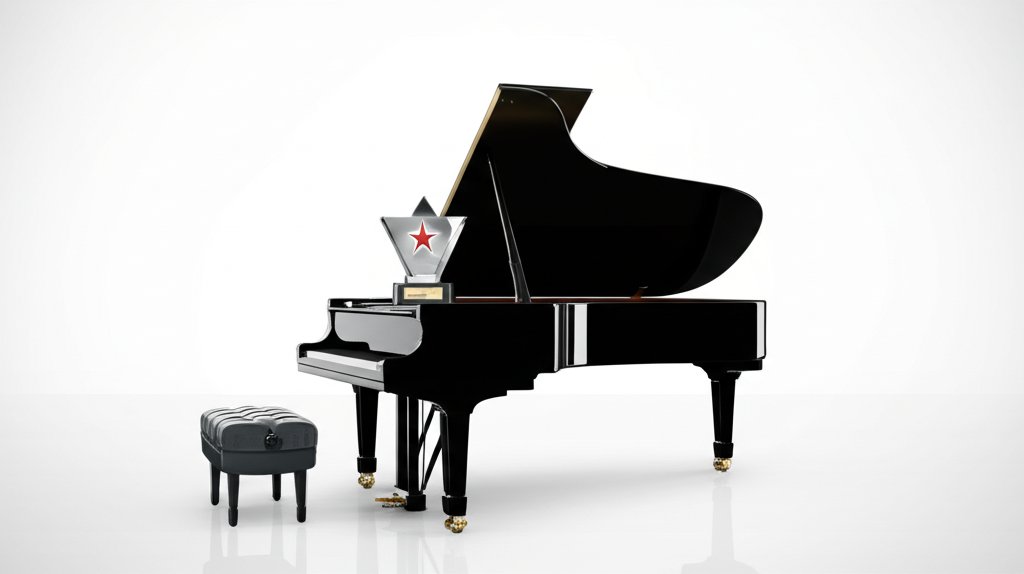The Texas piano competition circuit is a vibrant, demanding, and constantly evolving landscape. For young pianists aiming to make their mark, understanding this terrain is as critical as mastering a fiendishly difficult etude. As some competitions shift their focus, others rise in prominence, creating new opportunities for emerging artists to showcase their talent, win prestigious awards, and launch professional careers. Navigating this requires more than just technical skill; it demands strategic planning and a clear understanding of each event’s unique demands.
At a Glance: Your Roadmap to Texas Piano Competitions
- Discover Key Competitions: Learn the distinct differences between major events like the Young Texas Artists (YTA) Music Competition, the legacy of the South Texas Piano Competition, and the immersive PianoTexas festival.
- Master the Application: Get a step-by-step breakdown of the rigorous YTA application process, from repertoire selection to file submission protocols.
- Strategic Repertoire Planning: Understand why specific repertoire, like a full concerto and a Beethoven sonata, is required and how to choose pieces that highlight your strengths.
- Prepare for Performance Day: Unpack the on-site expectations, including memorization, formal attire, and the crucial 12-minute time limit for final rounds.
- Navigate a Changing Landscape: See how the scene is shifting with the South Texas Piano Competition’s transition, and what it means for future participants.
The Evolving Landscape: From Pre-College to Professional Stages
Not all competitions are created equal. The Texas piano competition scene offers a tiered system of opportunities, catering to everyone from talented middle schoolers to artists on the cusp of a concert career. Recognizing where you fit is the first step toward success.
The Foundation: Celebrating Pre-College Achievement
For a decade, the South Texas Piano Competition served as a vital platform for pre-college students, consistently recognizing exceptional young players. While the organization is now shifting its role to become a supporter of other arts programs, its final awards in 2025 highlight the incredible talent pool it nurtured.
2025 South Texas Piano Competition Laureates:
- Piano Solo Division I: Timothy Guan, Matthew Chien, Justin Sun
- Piano Solo Division II: Alexander Sun, Josephine Chow, Eliana Chen
- Piano Solo Division III: Evangeline Morson, Carl Rubly, Alyssa Wong
- Piano Concerto Division: Josephine Chow
The transition of this competition underscores a key reality: the arts landscape is dynamic. For families and teachers who previously targeted this event, the focus now shifts to identifying other regional competitions or preparing for the next level of performance.
The Professional Launchpad: Young Texas Artists (YTA) Music Competition
For classical artists ready to move from advanced student to emerging professional, the Young Texas Artists (YTA) Music Competition is a premier destination. Held over three days, this event is a high-stakes affair with significant prize money and exposure. It’s designed for artists aged 18-30 (with a slightly higher range for vocalists) who are either Texas residents or enrolled in a Texas music school.
The YTA isn’t just a competition; it’s a professional audition. The judges are looking for artists who possess not only technical fluency but also the polish, stage presence, and musical maturity to command a concert hall.
The Immersive Experience: PianoTexas International Festival & Academy
Positioned at the highest echelon is PianoTexas. Celebrating its 45th anniversary in June 2025, this isn’t a traditional competition but an intensive festival and academy. It offers distinct programs for Young Artists, Juniors, Teachers, and Amateurs. Its close association with the Van Cliburn International Piano Competition gives it an unparalleled level of prestige. Participating in PianoTexas means immersing yourself in a world of masterclasses, recitals, and networking with international figures, offering a different kind of prize: world-class artistic development.
The YTA Playbook: Deconstructing a High-Stakes Application

Success at a top-tier Texas piano competition like YTA begins months before you ever touch a key on stage. The application process is a rigorous test of your preparation, professionalism, and attention to detail.
Mark Your Calendar: Key Dates & Deadlines
The timeline for the 2026 Young Texas Artists Music Competition is firm. Missing a deadline is not an option.
- Competition Dates: March 12-14, 2026
- Piano Division Preliminary Round: Morning of March 14, 2026
- Finals Concert & Awards: Evening of March 14, 2026
- Application Deadline: December 31, 2025, at 11:59 PM CST
Treat the application deadline as your first performance. Submitting early avoids last-minute technical glitches and shows foresight.
Repertoire Strategy: The Concerto and Beethoven Test
YTA’s repertoire requirements for pianists are specific and demanding:
- A complete concerto.
- One movement from a Beethoven Sonata.
This isn’t an arbitrary choice. The concerto demonstrates your ability to collaborate, lead, and sustain musical energy over a large-scale work. It tests your stamina and your understanding of dialogue between soloist and orchestra. Mastering this requires a deep understanding of structure and pacing, core concepts covered in the Piano Comp Mastery Guide. The Beethoven sonata movement reveals your grasp of classical form, stylistic nuance, and architectural phrasing.
Your selection should be strategic. Choose a concerto that is not only a technical showpiece but also one that resonates with your musical personality. For the Beethoven, select a movement that contrasts with your concerto and showcases a different facet of your artistry—perhaps a lyrical Adagio if your concerto is fiery and virtuosic.
Crafting Your Application Package: Beyond the Recording
Your submitted materials create the first impression you make on the jury. Each component must be polished and professional.
Your YTA Application Checklist:
| Component | Fee/Requirement | Expert Tip |
|---|---|---|
| Application Fee | $70 (non-refundable) | Pay this early to confirm your intent. It’s a standard part of professional competitions. |
| Collaborative Pianist | $125 (if using theirs) | If you’re performing a work with piano accompaniment (less common for pianists but relevant for other divisions), using the competition’s pianist ensures they know the venue and process. However, bringing your own long-term partner can offer more comfort. |
| Curriculum Vitae (CV) | 1-2 pages | Focus on musical achievements: past competitions, major performances, summer festivals, and influential teachers. Keep it clean and easy to scan. |
| Headshot | Professional quality | This will be used in the program. It should reflect a serious, professional artist. Avoid casual selfies. |
| Recording | Minimum 15 minutes (audio/video) | Ensure high-quality audio. The recording should be a continuous, unedited performance of your chosen repertoire. This is your primary audition. |
| Repertoire List | Program-ready format | List pieces with composer, full title, opus numbers, and movement titles. Accuracy is paramount. Check spellings and formatting. |
| File Naming | Follow specific convention | YTA requires a strict format (e.g., LastName_FirstName_PieceTitle.pdf). Following this seemingly small rule shows you are detail-oriented and respectful of the process. |
| Case Snippet: A pianist I coached was a finalist at a major competition. She later learned that the jury was immediately impressed with her application because her CV was concise, her repertoire list was flawlessly formatted, and every file was named correctly. It signaled a level of professionalism that made them eager to hear her play. |
Beyond the Application: On-Site and Performance Protocols

Once your application is accepted, the preparation shifts to the live performance. The rules are strict and designed to simulate a professional concert engagement.
The Performance Mindset: Memory, Attire, and Scores
YTA, like most elite competitions, has clear expectations for the live rounds:
- Performance from Memory: This is non-negotiable. It demonstrates deep mastery of the music and allows for a more direct connection with the audience and jury.
- Formal Concert Attire: For the finals, you are on a concert stage. Dress as you would for a professional solo recital. Your appearance is part of the total performance.
- Provide Clean Scores: You must provide the jury with two original, unmarked scores for each piece you perform. This is for them to follow along and assess your fidelity to the composer’s intent. “Unmarked” is key—photocopies with your own fingerings or notes are not acceptable.
The 12-Minute Final Round: Curating Your Best Impression
The final round performance is capped at 12 minutes. This is a tight window to make a lasting impact. If your chosen concerto movement or sonata is longer, you must make intelligent, musical cuts.
This isn’t about simply stopping at the 12-minute mark. It’s about creating a compelling, cohesive musical arc within the time limit. For example, if performing the first movement of the Tchaikovsky Concerto No. 1, you might need to make standard, approved cuts in the development or cadenza. Practice your 12-minute version relentlessly so it feels natural and musically inevitable, not like a truncated piece.
Quick Answers to Common Questions
Q: Is the South Texas Piano Competition still happening?
A: No, not in its former role as a student competition. After its 2025 awards, the organization has transitioned to a new mission of supporting other arts programs and educational presentations in Texas. Aspiring competitors should now look to other regional and state-level events.
Q: I’m 17, but I’ll be 18 a month after the Young Texas Artists competition. Can I still apply?
A: Unfortunately, no. Eligibility is based on your age at the time of the competition. For YTA, instrumentalists must be between 18 and 30 years old. It’s crucial to check the specific age requirements for any Texas piano competition you target.
Q: What’s the biggest mistake applicants make for a major Texas piano competition?
A: The most common and avoidable mistake is a lack of attention to detail in the application. This includes ignoring specific repertoire requirements (e.g., submitting two Romantic pieces when a Classical sonata is required), failing to follow file naming conventions, or submitting a poor-quality recording. These errors suggest a lack of seriousness and can get an otherwise talented musician screened out before they’re even heard.
Q: Does YTA provide a piano for the competition rounds?
A: Yes, all preliminary and final rounds are held in a professional concert hall with a high-quality, concert grand piano. You will not need to arrange for an instrument. However, securing practice time on a similar quality instrument leading up to the competition is highly recommended.
Your Next Move on the Texas Stage
The Texas piano competition landscape offers a clear pathway for dedicated musicians, from foundational events to professional springboards like the Young Texas Artists Music Competition and immersive studies at PianoTexas. Success hinges on choosing the right venue for your current skill level and meticulously preparing every aspect of your performance, starting with the application.
Your immediate next step is to assess your repertoire. Do you have a full concerto and a Beethoven sonata movement at a performance-ready level? If you’re targeting the 2026 YTA competition, the time to begin polishing those works is now. Analyze the requirements, mark your calendar, and start assembling the components of a winning application. In this competitive arena, preparation is everything.
- Discover Affordable Singing Lessons Near Me to Unlock Your Potential - February 24, 2026
- Affordable Vocal Lessons Bring Professional Singing Guidance Within Reach - February 23, 2026
- Local Vocal Lessons Offer Expert Guidance for Every Singer - February 22, 2026










